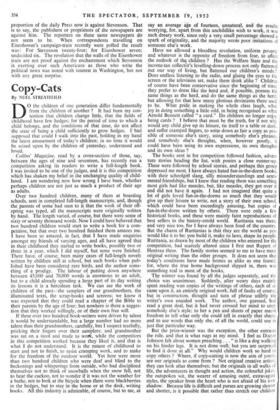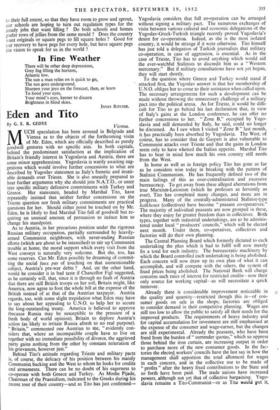Copy-Cats
By NOEL STREATFEILD
DO the children of one generation differ fundamentally from the children of another ? It had been my con- tention that children change little, that the fields of childhood have few hedges; for the period of time to which a child belongs, and the conditions of that time, do not affect the state of being a child sufficiently to grow hedges. I' had supposed that could I walk into the past, holding in my hand the latest amusement of today's children; in no time it would be seized upon by the children of yesterday, understood and loved.
Collins Magazine, read by a cross-section• of those, say, between the ages of nine and seventeen, has recently run a competition asking its readers to write a full-length book. I was invited to be one of the judges, and it is this competition which has shaken my belief in the unchanging quality of child- hood. I am wondering now how wrong I have been, whether perhaps children are not just as much a product of their age as adults.
Over two hundred children, many of them at boarding schools, sent in completed full-length manuscripts, and, though the parents of some had seen to it that the work of their off- spring was typed, all the manuscripts were originally written by hand. The length varied, of course, but there were some of sixty or seventy thousand words. Now I could have believed that two hundred children would start to write a book for a com- petition, but that over two hundred finished them amazes me. I have been so amazed, in fact, that I have made enquiries amongst my friends of varying ages, and all have agreed that in their childhood they started to write books, possibly two or three in a year, which I did myself, but none were finished. There have, of course, been many cases of full-length novels written by children still at school, but such books when pub- lished have been considered rare birds, and the author some- thing of a prodigy. The labour of putting down anywhere between 45,000 and 70,000 words is enormous to an adult, but to a child already spending a large part of its day writing its lessons it is a herculean task. We can see the work of children of the past—the samplers of our grandmothers, the illuminated texts, the scrap-books and screens; we know it was expected that they could read a chapter of the Bible to their parents by the age of four; but nowhere is there a sugges- tion that they worked willingly, or of their own free will.
If these over two hundred book-writers were driven by talent it would be understandable, but a large number had no more talent than their grandmothers, carefully, but I suspect tearfully, pricking their fingers over their samplers; and grandmother was sat on a stool and made to work, while the competitors in this competition worked because they liked it, and that is what I do not understand. It is the nature of childhood to start and not to finish, to resist cramping work, and to make for the freedom of the outdoor world. Yet here were more than two hundred children who were deaf and blind to the beckonings and whisperings from outside, who had disciplined themselves not to think of snowballs when the snow fell, not to hear the cuckoo, not to wonder if it was not the weather for a bathe, not to look at the bicycle when there were blackberries in the hedges, but to stay in the home or at the desk, writing books. All this industry is admirable, of course, but to me, at say an average age of fourteen, unnatural, and the results worrying, for, apart from this unchildlike wish to work, it was such dreary work, since only a very small percentage showed a spark of originality, and the majority wrote poor imitations of someone else's work.
Have we allowed a bloodless revolution, uniform poverty and whatever is the opposite of freedom from fear, to affect the outlook of they -children ? Has the Welfare State and the income-tax collector's levelling-down. process not only flattened out our way of living, but flattened our children's minds ?
Does endless listening to the radio, and gluing the eyes to the screen or the television set, make them think alike ? Children of course have been conservative since the beginning of time; they prefer to dress like the herd and, if possible, possess the same things as the herd, and do- the same things as the herd; but allowing for that how many glorious deviations there used to be. What pride in making the whole class laugh, what joy in doing something a little odd, in being recognised as what Arnold Bennett called " a card." Do children no longer enjoy being cards ? I believe that must be the truth, for if not why would any child give up its leisure, tie itself to a table or desk, and suffer cramped fingers, to write down as fair a copy as pos- sible of someone else's story, using somebody else's phrases, and somebody else's thoughts, when, however poorly, it could have been using its own expressions, its own thoughts and its own ideas ?
The books sent in for competition followed fashion, adven- ture stories heading the list, with ponies a close runner-up. These were followed by school stories, and perhaps, this group depressed me most. I have always hated fun-in-the-dorm books. with their schoolgirl slang, silly misunderstandings and senti- mental friendships, but I knew that reading them was something most girls had like measles, but, like measles, they got over it and did not have it again. I had not imagined that quite a lot of girls loved fun-in-the-dorms so much that they would give up their leisure to write, not a story of their own school, which could have been exceedingly amusing, but copies of fun-in-the-dorm written by others. There were only a few historical books, and these were mainly faint reproductions of best sellers in the history-retold world. Ruritania was there, and very nice too, for I have always been fond of the country. But the charm of Ruritanias is that they are the world as you would like it to be; you build it, make its laws, shape its people. Ruritania, as drawn by most of the children who entered for the competition, had scarcely altered since I first met Rupert of Hentzau there. The family stories seemed to me to have more original writing than the other groups. It does not seem that today's conditions have made homes as alike as one feared, for, where the true home background slipped in, there was something real in most of the books.
The winner was found by all the judges separately, and the choice was unanimous. Suddenly, after weary days mainly spent reading wan copies of the writings of others, each of us came upon it, an entirely original work, full of faults of course, but in construction, thought and turn of phrase utterly the writer's own unaided work. The author, one guessed, bad read a great deal, but it had never crossed her mind to copy somebody else's style; to her a pen and sheets of paper meant freedom to tell what only she could tell in exactly that shape, and to use words that only she, of all the world, could use in just that particular way.
But the prize-winner was the exception, the other entrants the rule, and that is what nags at my mind. I feel as Doctor Johnson felt about women preaching . . .." is like a dog walking on his hinder legs. It is not done well; but you are surprised to find it done at all." Why would children work so hard to copy others ? Where, if copy-catting is now the aim of youth, are our originals to come from ? Not original creative artists; they can look after themselves; but the originals in all walks of life, the adventurers in thought and action, the colourful joker, the outspoken wit, the wearer of amusing outré, extravagant styles, the speaker from the heart who is not afraid of his own shadow. Because life is difficult and purses are growing shorter and shorter, is it possible that rather than stretch our children to their full extent, so that they have room to grow and sprout. our schools are hoping to turn out regulation types for the steady jobs that want filling ? Do both schools and homes prefer rows of jellies from the same mould ? Does the country want originals or square pegs to fill square holes ? Good for our recovery to have pegs for every hole, but have square pegs the vision to speak for us in the world ?



































 Previous page
Previous page